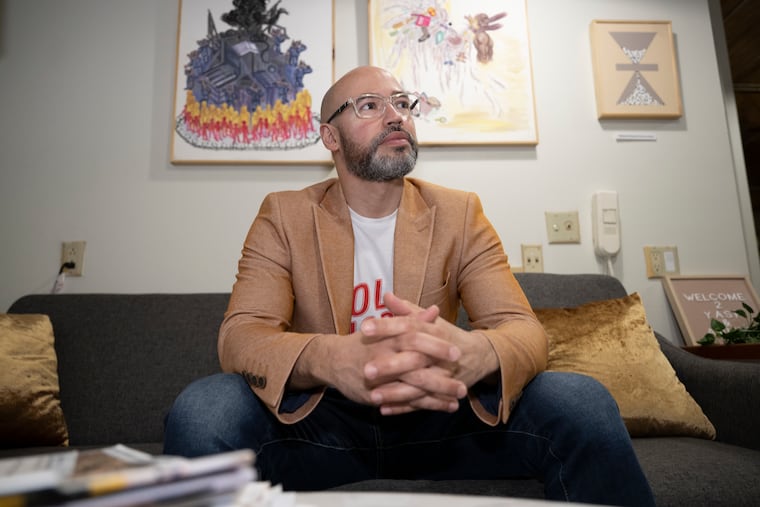I was sentenced to life without parole at age 18. I’m proof that redemption is possible.
I served nearly 30 years in prison for something that happened when I was a teen. Now I work to help others avoid the same fate.

Thanks to a January ruling, some 200 people who were sentenced to die in prison in Massachusetts now have a chance at freedom.
In Commonwealth v. Mattis, the state’s highest court ruled that anyone who committed a crime under the age of 21 can no longer be sentenced to “death by incarceration,” more commonly known as life without parole. Before this ruling, the age limit was 18. Now, Massachusetts is the first state to forbid death-by-incarceration sentences for people found guilty of crimes committed before their 21st birthday.
If only something like this could happen here.
Pennsylvania is one of a shrinking minority of states that mandates all people (including late adolescents) convicted of first- or second-degree murder to be sentenced to stay in prison until they die. Today, Pennsylvania houses over 5,000 people serving death-by-incarceration sentences — that’s nearly one of every seven imprisoned people in the state. Roughly half were sentenced before they turned 26, making Pennsylvania the state with the youngest population of people serving death by incarceration.
For almost 27 years, this count also included me.
In 1996, I was sentenced to death by incarceration after pleading guilty to first-degree murder following poor legal advice that a “life” sentence meant 15-20 years. I was 18 at the time of my crime. Not until arriving at SCI-Graterford a couple of weeks after sentencing did I learn that I was actually sent there to grow old and die.
In 2022, after years of fierce advocacy by those inside and out of prison, my sentence was commuted by the state’s Board of Pardons, and following approval from Gov. Tom Wolf, I was freed. I was one of only a few people able to transcend this permanent sentence via clemency, during a brief alignment of the political stars.
The idea that it took sheer luck to be released after serving nearly three decades for a crime that occurred while I was still a teen underscores America’s perverted system of extreme punishment.
But more people are realizing it shouldn’t be this way.
According to brain science, at age 18, people are more like adolescents than adults. Up until around age 25, people have less control over their impulses and emotions and are more likely to make bad decisions. In emotionally charged situations, that immaturity — combined with a history of trauma — can easily lead to violence.
In other words, these behaviors aren’t explained by an inferior moral character. Instead, they’re the result of someone’s environment and incomplete brain development.
Half a dozen states are now aligning their criminal legal systems with brain science, acknowledging that late adolescence reduces culpability, and are taking a second look at people given indefinite sentences at this life stage.
While incarcerated, I worked hard to find meaning in a place stripped of dignity. After a few years of adjustment and getting into some minor trouble, I rediscovered my Catholic faith, cofounded a restorative justice project, earned a bachelor’s degree, and served as a hospice caregiver, sitting at men’s bedsides as they took the last breaths of their death-by-incarceration sentences. This turn began in my mid-20s. And I never looked back.
Now a free man for a year and a half, I’m a homeowner, fiancé, and soon-to-be first-time dad. But personal transformations in prison like mine are hardly unique. In one prison alone, I left behind hundreds, many of whom mentored me, who are equally deserving of this opportunity.
Offering second chances to people condemned to die in prison won’t cause a spike in crime. Of the hundreds of former juveniles released in Pennsylvania after the U.S. Supreme Court banned mandatory death by incarceration for people under 18, only 1% returned to prison, and none for anything as serious as the original crime.
Research from the Sentencing Project finds that a staggering two-thirds of those sentenced to death by incarceration while young were Black, suggesting that being young and Black is even more predictive of receiving this sentence than being Black alone.
If Pennsylvania is ever to get serious about downsizing its death-by-incarceration population, it should start by forbidding the use of this sentence on late adolescents, as it is out of line with the broad scholarly consensus that brain development extends far beyond age 18.
Massachusetts has rightly ruled that snuffing out young people’s futures — given the likelihood of change as they mature — is especially cruel and inhumane. And while agreeing to review these cases will not swing open the prison gates, it does provide something every human deserves: hope.
Pennsylvania needs to stop being an outlier, get with brain science, and follow Massachusetts’ lead.
Felix Rosado was sentenced to death by incarceration at age 18 and served 27 years in prison before his sentence was commuted. Today, he coordinates a youth restorative justice diversion program called Healing Futures with the Youth Art & Self-empowerment Project and is an adjunct professor at Chestnut Hill College.